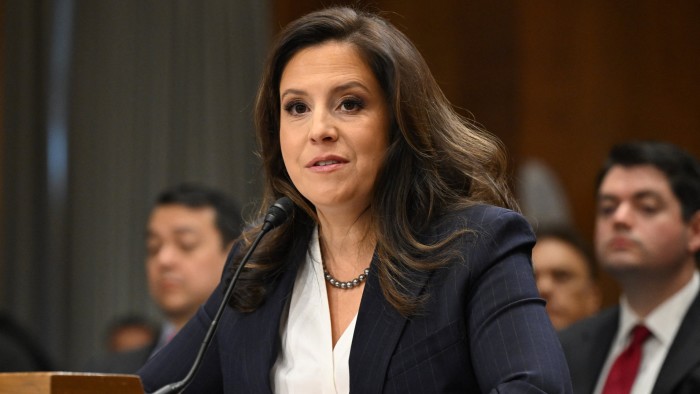Unlock the White House Watch newsletter for free
Your guide to what the 2024 US election means for Washington and the world
Donald Trump has withdrawn the nomination of Elise Stefanik for US ambassador to the UN as Republicans try to hold on to their razor-thin majority in the House of Representatives.
The president on Thursday said he had asked the New York congresswoman to remain in Congress rather than taking up the diplomatic appointment to forestall an election for her seat.
“As we advance our America First Agenda, it is essential that we maintain EVERY Republican Seat in Congress,” Trump wrote on his Truth Social platform.
“The people love Elise and, with her, we have nothing to worry about come Election Day. There are others that can do a good job at the United Nations.”
The decision to pull the nomination underscores the narrow majority Republicans hold in Congress and growing concerns that the party risks losing seats amid a voter backlash against the Trump administration.
Stefanik’s appointment as ambassador would have triggered a special election in her New York district. A loss by Republicans would have further narrowed the party’s majority in the House, making it exceedingly difficult to pass legislation through the chamber.
The party holds 218 House seats to the Democrats’ 213, meaning Speaker Mike Johnson can only afford to lose two votes on any bill if all Democrats vote against it. The party narrowly passed a crucial budget bill this month when Kentucky congressman Thomas Massie broke ranks.
Johnson on Thursday welcomed Stefanik’s “selfless decision” and said he was “grateful for her willingness to sacrifice that position and remain in Congress to help us save the country”.
“It is well known Republicans have a razor-thin House majority, and Elise’s agreement to withdraw her nomination will allow us to keep one of the toughest, most resolute members of our Conference in place to help drive forward President Trump’s America First policies,” he said on X.
A longtime Trump ally, Stefanik was elected to Congress in 2014. She gained prominence as a defender of the president during his 2019 impeachment hearings and in 2023 for her grilling of university presidents over alleged antisemitism on campus.
Her withdrawal comes amid growing jitters over the party’s ability to hold on to its Congressional majority ahead of special elections next week to fill two vacant seats previously held by Republicans.
The party had been widely expected to win both seats, but concerns have grown over its ability to win a race to fill the Florida seat formerly held by Mike Waltz, Trump’s embattled national security adviser.
Read the full article here




